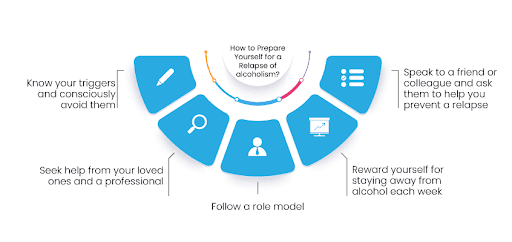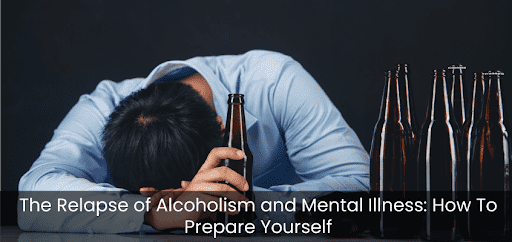Introduction
Drinking alcohol is a standard social norm today, and we party for a varied range of reasons–celebrations, socialising, toasting an achievement or burying our sorrows. Drinking is pleasurable as it helps change the mood.
Alcohol, when consumed in small quantities, relaxes our mind and body and makes us more expressive and confident. But problems arise when people start using alcohol as a coping mechanism. Did you know that alcohol has a solid link to mental health illnesses? Here’s all you need to know about the relapse of alcohol and its association with mental health illness.
Our Wellness Programs
How Frequently Does relapse of alcoholism occur?
Substance abuse disorders are considered mental health illnesses. You should treat them as you would chronic diseases like diabetes and hypertension. People who are alcoholics require de-addiction measures to reduce their dependence on the substance.
- You are said to be in recovery when you have achieved sobriety. But the most challenging part is to stay in earnest and not slip back into the habit.
- Alcohol relapse is common among people recovering from alcohol abuse.
- Over 30% of people on their path to recovery tend to relapse in their first year of sobriety.
- While the first year is the most challenging, alcohol relapse rates decrease over time. It is essential to understand that the longer an individual stays sober, the lesser their chances of relapse.
Looking for services related to this subject? Get in touch with these experts today!!
Experts

Banani Das Dhar

India
Wellness Expert
Experience: 7 years

Devika Gupta

India
Wellness Expert
Experience: 4 years

Trupti Rakesh valotia

India
Wellness Expert
Experience: 3 years

Sarvjeet Kumar Yadav

India
Wellness Expert
Experience: 15 years
Reasons for relapse of alcoholism
While no one wishes to slip into alcoholic relapse, here are some common reasons for it:
- Inability to manage their withdrawal symptoms
- Unaddressed mental health conditions like depression, anxiety, mania, personality disorders, post-traumatic stress disorders, and depression
- Surrounded by people who drink excessively or suffer from substance abuse
- The temptation to visit places that serve alcohol and fall prey to these emotions
- Any object or item that reminds you of drinking can increase cravings and make you fall prey to temptation.
- Lack of adequate self-care
- Lack of safe, healthy relationships with friends, family, or partner
- Overconfidence
- Boredom
- Social isolation
- Inability to deal with uncomfortable emotions
Does Relapse of Alcoholism Lead to Bipolar Disorder?
1. Alcohol affects your mind and body at the same time. It is a central nervous system depressant and modifies the neurotransmitter (chemical messenger) levels in the brain, resulting in altered mood, feeling, behaviour and thoughts. It is said to affect that part of your brain that controls inhibition, due to which one may feel less inhibited and more relaxed after a couple of drinks.
In people with pre-existing mental health illnesses, the wearing off of the alcohol effects precipitates negative emotions, feelings, and behaviours. Since alcohol slows down your mind and body, it may become harder for people, especially those with conditions like bipolar disorders, to understand how they are feeling and the consequences of their actions.
Existing research states that people who suffer from alcohol abuse are more likely to develop bipolar disorder. Around 45% of people with bipolar disorder have a history of alcohol use disorder (according to a review published in 2013). People with both conditions are at an increased risk of developing severe consequences, including death by suicide. The good news is that both bipolar disorder and alcoholism are treatable conditions.
Relation Between Relapse of Alcoholism and Mental Illness
Several studies show the strong interlink between relapse of alcoholism and mental health illnesses. When you consume alcohol, it disrupts the neurotransmitter levels in the brain.
While we need a certain amount of neurotransmitters to keep illnesses like anxiety and depression away, in chronic alcoholics, alcohol reduces the number of neurotransmitters and precipitates negative feelings and emotions. It prompts these individuals to consume more alcohol and sets off a vicious cycle of alcohol dependence, making them susceptible to mental health illnesses like:
- Anxiety
- Depression
- Psychosis
- Self-harm/ masochistic tendencies and suicide
- Anxiety
If you are feeling anxious, alcohol can quickly relax you. However, this effect is temporary. Drinking to relieve your anxiety can result in alcohol dependence, and hangovers can worsen your anxiety. If you want to manage your anxiety effectively, speak to a professional who can suggest safer, healthier ways like yoga and meditation to beat stress.
- Depression
Excessive chronic drinking cause symptoms of depression. People suffering from depression tend to feel better in the initial days when they stop drinking. If you feel your depression symptoms improve when you stop drinking, the chances are that alcoholism is behind your mental health condition. If you don’t see any improvement in your symptoms, you must seek professional help for your depression.
If you are taking antidepressants, you must quit alcohol altogether to avoid the adverse effects of the medication. Studies have shown that drinking while taking antidepressants can cause alcohol relapse.
- Psychosis
Chronic alcoholics often have psychosis when they suddenly stop drinking. They also have a high chance of showing alcohol relapse.
- Self-harm/masochistic tendencies and suicide
Alcohol, as we know, reduces inhibitions and makes one more courageous. Sometimes, this also results in people acting impulsively, leading to suicide. Excessive drinking can trigger negative emotions and suicidal thoughts among alcoholics.

How to Prepare Yourself for a Relapse of alcoholism?
The most effective way to prepare yourself for relapse is to prevent it. To do so, you must first understand the stages of deterioration and how to identify them.
Here is how you can prepare (and effectively prevent) alcohol relapse:
- Know your triggers and consciously avoid them
- Remember why you quit drinking and put affirmations of it everywhere around your home or office space
- Seek help from your loved ones and a professional
- Create a self-care routine that is more enjoyable and indulgent than drinking
- Keep your prescription medications for managing withdrawal symptoms at hand
- Create a busy daily routine that gives you no time to think about drinking
- Reward yourself for staying away from alcohol each week
- Follow a role model
- Speak to a friend or colleague and ask them to help you prevent a relapse
Conclusion
Recovery from alcohol and substance abuse is a long, winding, and challenging road. While many people begin their journey on the path to recovery and sobriety, the chances of alcohol relapse are relatively high. With the right professional help, individual motivation, and determination, one can overcome alcohol dependence. Yes, it takes a long time to kick the habit, but being aware of the stages of relapse and recognising your trigger factors are critical in helping you ditch alcohol.
At the same time, it is essential to understand that many alcoholics end up with mental health illnesses. But, seeking help at the right time can help you quit your habit and recover from mental health illnesses that you may have. Commitment to leading a healthy, fulfilling life for yourself and your loved ones is an all-encompassing motivation to prevent alcohol relapse and recover from your mental illness.
















